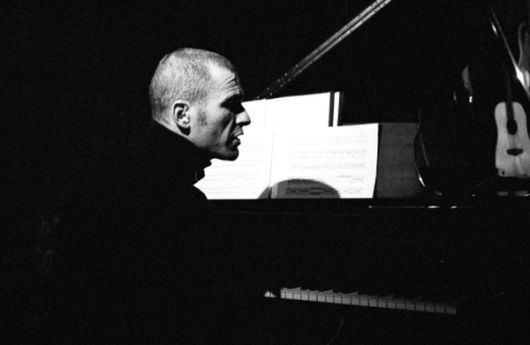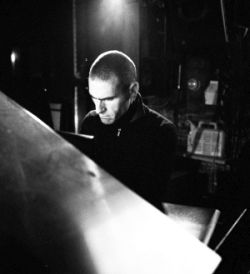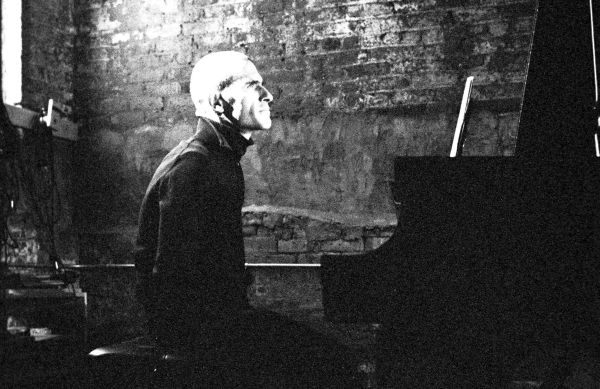
Quietly creative, yet atmospherically entrancing [2020-05-28]Over the last few years or so, French pianist Melaine Dalibert has put out a series of sparse, atmospheric & at times memorable piano-based albums- making him one of the more consistent & appealing artists to appear from the modern classical/ minimalism scenes in the last ten years. I’ve closely followed his career since around 2017, and now as he has five albums under his name, and is gaining the wider respect he deservers I thought it a fitting time to set up an interview with him. M[m]: Please discuss how your music taste has developed & changed over the years?. And when did you first get fascinated by more minimalistic forms of sound?
Melaine Since childhood, I,ve had the chance to hear all kinds of music: my parents' record collection included a lot of folk, rock, and some great classics. My vocation as a pianist was fixed relatively late, and as a young man, I was focused on the great repertoire, with a predilection for modern French and Russian and a few romantics (Schubert, Brahms, Liszt, Chopin). It wasn't until I got out of the Paris Conservatory that contemporary music, like jazz, really became important to me. First, I was fascinated by the constructivist inventiveness of composers like Messiaen, Boulez, Ligeti or Carter, but little by little, and by my frequentation of visual artists like Vera Molnar or François Morellet from the 2010s, I am interested in minimalism and the radiant & radical nature of their systems.
M[m]: When did you first start playing the piano- and how long was it before you decided you wanted to play the instrument full-time?
Melaine I started learning piano at the age of eight at a small music school, but with a very good teacher. He must have suffered with me because I was not very hardworking, and mainly concerned with the invention more than with studies- at the age of fifteen, he had the good idea of making me practice the concerto in G by Ravel-this was the piece that sparked my passion, and my motivation to work. I devoted myself to the study of my instrument after scientific studies in high school, all the way up to today where I teach students at the Rennes conservatory, and record my own work- and I now teach concerto in G by Ravel to my pupils.

M[m]: You mention teaching students the piano- how long have you been doing this, and I’m guessing it must be rather rewarding seeing the students grow in confidence & ability?
Melaine I've been teaching since I was twenty, so I've spent half of my life doing it now! I started in small schools and I am now a full professor at the Rennes conservatory. It is indeed a very rewarding profession, which relies on trust and a privileged relationship with the students. Sometimes, we spend more than ten years with them! I accompany them in their technical acquisition of course, but the most exciting is to make them discover the immensity of the musical field. Sometimes, we see authentic artistic natures emerge!
M[m]: You self-released your debut 2015’s Quatre Pièces Pour Piano. What are your thoughts on this first release, and do you have any plans to reissue it?
Melaine These four piano pieces are the first compositions of which I am proud. They are fairly distant from what I write now: there are very rigorous processed, although unpredictable by ear, and often use a chromatic language that I’ve distanced myself from. There are no plans to reissue at the moment, but I don't rule that idea out!
M[m]: you talk about how your writing changed after you wrote the pieces Quatre Pieces Pour Piano- please discuss this?
Melaine The first step in this change was to refocus on more diatonic colors, without registering in a functionally tonal thought. The pieces on the "ressac “ and "cheminant" albums come under this aspiration, after spending almost ten years concentrating on an ultra-systematic (algorithmic) writing, in search of music that develops without resorting to a subjective will, I felt the need to test my ability to give life to simpler forms, like songs. For me, it is not a change in aesthetic posture: it is the exploration of another technique, which dictates its new constraints by itself, as a painter would go from oil to watercolor. ..
M[m]: Quatre Pièces Pour Piano saw you offering up a selection of tracks influenced by some of your favorite composers/pianists- like Feldman, Cage, and Aki Takahashi. Could you discuss some of your favorite pieces/ work by each of these three?
Melaine I got into the habit of dedicating my pieces to friends or artists who influenced me; surely the works of Cage and Feldman, like the recordings of Aki Takahashi, made a big impression on me. To quote a few pieces that I like: Empty Words by Cage, Patterns in a Chromatic Field by Feldman, music by Peter Garland under Takahashi's fingers ...

M[m]: What do you see as influences on your work, aside from composers/ players you admire?
Melaine I was deeply marked by the visual arts, mainly by constructivists/minimalists like Josef Albers, Vera Molnar, Francois Morellet, Frank Stella, Donald Judd ... I would not dare to make a connection between my literary affinities and my music, but I was fascinated by romans of Proust, their extraordinary tangle of events like his style, which makes us feel singularly all the complexity of what we mean by "time".
M[m]: I first became aware of your work back in 2017 when you put out your second album Ressac on Another Timbre- it found you offering up two compositions that managed to be both stark, beautiful & perfect controlled. How did you come to be release on the label, and how did you go about selecting the two pieces for the album?
Melaine In 2016, a year before the release of "ressac", I recorded most of the tracks from a monographic album of the music of Giuliano D’Angioloni, an Italian composer that I really like. I think that's what allowed me to gain the confidence of Simon Reynell (curator for Another Timbre)- He did not hesitate to publish my own music a year later, & I am very grateful to him. The two pieces that make up the album ("en abyme" and "ressac") are very complementary: the first is quite short and regularly pulsed, using the keyboard from bass to treble, while the second offers a flexible and stretched landscape, picked up in a single octave.
M[m]: Your next release was 2018’s Musique Pour Le Lever Du Jour- which saw you releasing the first of three (so far releases) on the US label Elsewhere Music. How did you come to work with the label, and what makes you happy to continue working with the label?
Melaine I met Yuko Zama at a concert I gave in New York in winter 2018. She was about to launch her first releases for her new label Elsewhere Music. On this occasion (it was with the composer Daniel Goode) she heard my "musique pour le lever du jour", which she liked it I guess! A few months later, the disc came out. And it found a nice audience!. I find in Yuko Zama, a friend, a person of high standards, giving in nothing to ease, and always listening to her artists. It’s was such a opportunity for me to have met her.
M[m]: Last year you put out Cheminant your fourth album- this was truly a wonderful & varied collection of work- please discuss how this album shaped up & came together, and from the start did you decide to make it a more varied release, or did it just develop that way?
Melaine After spending a lot of time composing the pieces "ressac" and "musique pour le lever du jour", which are very long pieces, I felt the need to focus on shorter forms. The five compositions on the "Cheminant" album are all algorithmically generated and could potentially last longer, but I wanted to give them a tighter format, so that the listener can enjoy a greater diversity of landscapes during one hour. There is also more harmonic verticality, which was new for my writing, usually more spelled. And even a certain virtuosity with the "percolations" piece for the right hand alone!
M[m]: Your most recent release has been this year's Paino Works- which see you playing the work of Greek composer Anastassis Philippakopoulosa- who/ when did you become aware of her work, and any plans to record any of her work?
Melaine It was Tom Johnson who introduced me to the composers of the Wandelweiser collective a few years ago. Among them: Michael Pisaro, Jürg Frey, Antoine Beuger in particular, and ... Anastassis Philippakopoulos! From him, I greatly appreciated the pieces for flute, and for piano, which Yuko naturally offered me to record. I am particularly sensitive to the climate that these works install: a kind of torpor outside of our contemporary habits, which revives through simple antique modes our centuries-old roots.

M[m]: I’m guessing you have your own piano/ set-up at home- what is it, and how often do you play at home ?
Melaine Yes, of course I have a piano at home, a house where I work most of the time when I'm not traveling. My piano is a Yamaha C3 model, dating from the excellent 1990s: my “musique pour le lever du jour” was recorded on it!
M[m]: You’ve now played live more than a few times- please discuss some of your stand out performances?
Melaine All concerts are important, regardless of the size of the audience! I sometimes play in large halls for certain projects, like the four piano works by Julius Eastman, but I must say that I particularly appreciate intimate concerts, where the public can be very close to the piano to enjoy it’s physical vibrations.
M[m]: What are you working on at present? And when do you hope to put some new out?
Melaine I wouldn't have supposed it a year ago, but I started to step aside with my algorithmic systems to write very intuitive music, kinds of pop-songs, but also two pieces that leave room to a certain freedom of improvisation. Two singles “piano loop” and “maelström” are in this vein. It is surely a transient episode, but it appeared to me to be necessary so as not to lock myself into certain procedures. It’s very important for me to feel free to write outside of any academy or chapel. An album is planned for the end of the summer ... on the Elsewhere label!
M[m]: What type of music do you listen to on downtime? And have you made any recent discoveries that have caught your ear?
Melaine I listen to music from all horizons and cultures: I come back very regularly to so-called ethnic or traditional music: for me, it's the basis. and I tend to listen less and less to "classical" music, which I already practice all day long while teaching or practicing my concert programs, and to fill in the gaps in my pop/folk culture: at the moment, David Sylvian, Talk Talk, Arthur Russell are looping in my air pods...
Thanks to Melaine for his time & effort with the interview- his last three albums Musique Pour Le Lever Du Jour, Cheminant, and Piano Works are available from US label Elsewhere music head here to purchase direct either CD albums or digital downloads. And Ressac is still available from Another Timbre here
Picture Credits:Shuan Lin Roger Batty
| 
